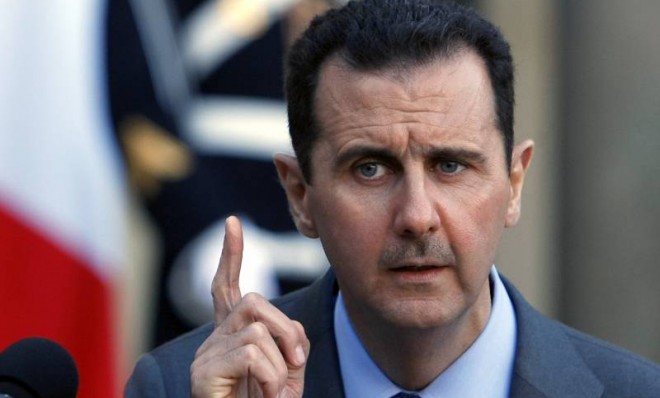Is a Syrian cease-fire on the horizon?
Syria's deputy prime minister says the civil war has reached a stalemate


A free daily email with the biggest news stories of the day – and the best features from TheWeek.com
You are now subscribed
Your newsletter sign-up was successful
After two and a half years of fighting that has claimed more than 100,000 lives, the Syrian civil war may finally be grinding to a halt.
At least that's what Qadri Jamil, Syria's deputy prime minister, told The Guardian this week, saying that the Syrian government had concluded that the war had reached a stalemate. In light of that, Jamil said, the government would call for a cease-fire at a future peace conference in Geneva.
"Neither the armed opposition nor the regime is capable of defeating the other side," he said. "This zero balance of forces will not change for a while."
The Week
Escape your echo chamber. Get the facts behind the news, plus analysis from multiple perspectives.

Sign up for The Week's Free Newsletters
From our morning news briefing to a weekly Good News Newsletter, get the best of The Week delivered directly to your inbox.
From our morning news briefing to a weekly Good News Newsletter, get the best of The Week delivered directly to your inbox.
Russia, the U.S., and the United Nations have been trying for months to bring the Syrian government and opposition rebels to the negotiating table for a proposed "Geneva II" peace conference, following peace talks last year that failed to end the conflict. With a chemical weapons deal inching forward, the parties met on their own in Geneva earlier this month and expressed cautious optimism for just such a plan.
Russian Foreign Minister Sergei Lavrov announced that a peace deal was the only lasting solution. He, along with Secretary of State John Kerry and a U.N. representative, had determined that "a political settlement is the only possible way to an early end to violence in Syria," he said.
Kerry echoed that sentiment, but added that everyone involved had "homework" to do before that could happen.
A cease-fire would first require the cooperation of both sides, a tall order.
A free daily email with the biggest news stories of the day – and the best features from TheWeek.com
The rebels have refused to even discuss a cease-fire unless Syrian President Bashar al-Assad steps down. Assad has refused to do so, and there is no indication he will change his mind anytime soon.
Furthermore, there are numerous rebel groups who have begun to fight amongst themselves. Deciding which among them would get to take part in any peace talks would be problematic.
The U.S. has asked that the Syrian National Coalition — the main umbrella group representing opposition forces — be the only invitee. Jamil said that won't fly with Syria.
"The paradox now is that the U.S. is trying to give the SNC the leading role," he told The Guardian. "We're fed up with this monopolistic view."
Also, the proposed cease-fire would carry some strings that might make it unpalatable to American diplomats. It would involve "an end to external intervention" that gives Syrians "self-determination without outside intervention and in a democratic way," Jamil said.
The U.S., meanwhile, is still trying to hammer out a deal, facilitated by Russia, to eliminate Syria's chemical weapons supply. If the deal falls through, the U.S. has said it could take military action — a clear form of "external intervention" — against Syria.
That's why Kerry has said that the peace process would "obviously depend on the capacity to have success" in the chemical weapons negotiations. In short, if the negotiations fall through, the peace process, too, could be doomed.
And Thursday, there was some indication that the negations were fraying.
Russian President Vladimir Putin said his government had "every reason to believe" the Syrian rebels were responsible for the August 21 chemical weapons attack. Kerry immediately responded with an angry, impromptu press conference, declaring, "We really don't have time today to pretend that anyone can have their own set of facts approaching the use of chemical weapons in Syria."
That's to say nothing of the fact that the war is not confined to Syria, involving the Shiite group Hezbollah, Iran, Saudi Arabia, and more. It has become a "regional war of proxies," wrote Jeremy Bowen, the the BBC's Middle East editor, which will make it even harder to resolve.
"So do not expect quick progress towards peace," he warned. "Or perhaps any progress at all."
Jon Terbush is an associate editor at TheWeek.com covering politics, sports, and other things he finds interesting. He has previously written for Talking Points Memo, Raw Story, and Business Insider.
